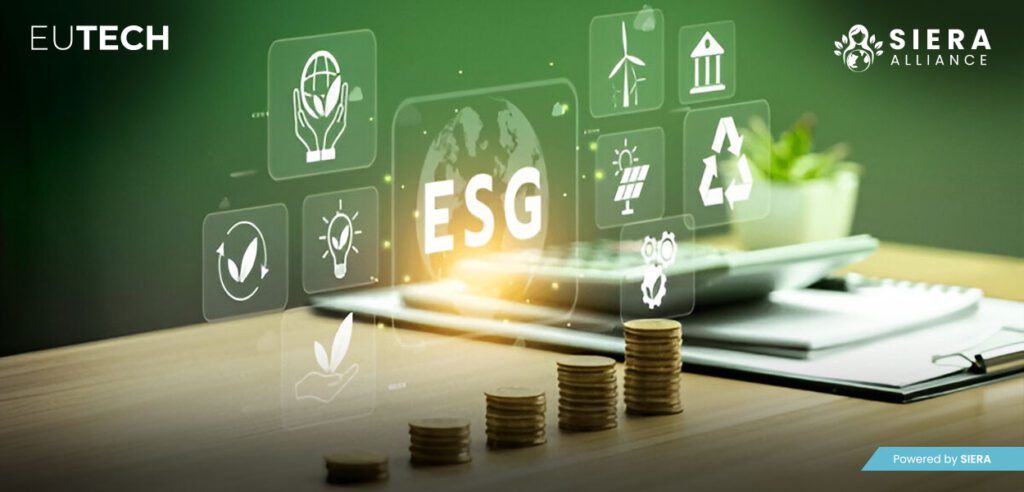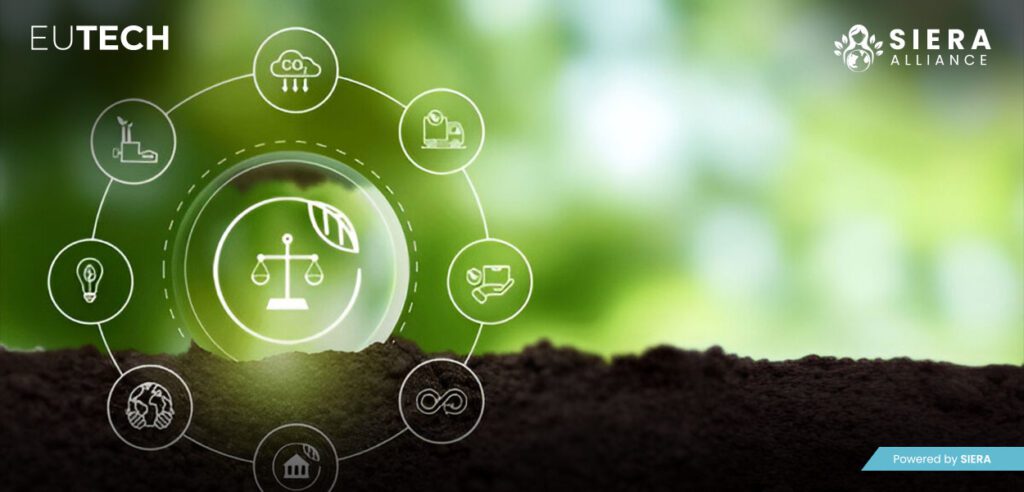On 6th February 2025, the EUTECH – Energy Council powered by SIERA Alliance hosted an insightful webinar titled “Integrating Social Compliance and Ethical Standards in Energy Operations.” Moderated by Melanie Klettl, the session brought together experts to discuss strategies for improving social compliance and ethical governance within the energy sector. Sigra Sharma, Head of Sustainability, Europe at SLB, and other panelists explored key challenges, including labor rights violations, supply chain transparency, community displacement, and the high costs associated with social compliance. The webinar emphasized solutions such as strengthening supply chain monitoring, promoting Diversity, Equity, and Inclusion (DEI) programs, and leveraging digital tools like blockchain and IoT to enhance transparency. The session also talked about SIERA Academy, which helps companies master the ESRS S1-S4 social standards and ESRS G1 governance standards through tailored training, empowering organizations to manage social responsibility independently.
SIERA Academy: Empowering Sustainable Practices
SIERA Academy is dedicated to empowering businesses by providing comprehensive training in the Social and Governance aspects of the Corporate Sustainability Reporting Directive (CSRD). Specializing in ESRS S1 to S4 (Social) and ESRS G1 (Governance), SIERA Academy helps companies master the complexities of social compliance and governance standards. With its tailored training solutions, SIERA Academy ensures that businesses can independently navigate the requirements of ESG reporting and align their operations with global sustainability goals. By fostering a deeper understanding of social impact and corporate governance, SIERA Academy equips organizations to implement effective strategies that promote sustainable business practices and drive long-term success.
Key Challenges in Integrating Social Compliance in Energy Operations
The energy sector faces several challenges when it comes to social compliance and ensuring ethical standards are upheld throughout its operations:
1. Labor Rights and Fair Treatment (S1)
The shortage of skilled labor is one of the most pressing issues. Over 70% of energy companies globally report difficulties in filling critical roles, especially in renewable energy installation and grid modernization. The gap in available skilled workers is expected to widen as the transition to green energy accelerates. However, a focus on training programs, especially in underserved areas, can address this challenge effectively.
2. Supply Chain Transparency (S2)
Global supply chains, critical to energy projects, complicate ethical compliance. Less than 30% of companies have full visibility of their supply chains, which leads to difficulty in monitoring labor and environmental standards across multiple geographies. Digital tools like blockchain can enhance visibility and provide real-time monitoring to ensure compliance.
3. Community Displacement and Social Impact (S3)
Energy projects can significantly impact local communities, especially in low-income regions, with nearly 10 million people displaced globally by energy infrastructure projects over the past decade. Ensuring that energy companies engage with local communities and mitigate the adverse effects of displacement is critical.
4. Human Rights Violations in Resource Extraction (S4)
The extraction of raw materials such as lithium and cobalt, often used in renewable energy technologies, can be linked to human rights violations, including child labor and unsafe working conditions. 40 million people are estimated to work in exploitative conditions within the mining industry. Addressing these concerns through ethical sourcing and supplier certifications is essential to maintaining social compliance.
5. Cost and Complexity of Social Compliance
Meeting the stringent social compliance standards can be expensive, with compliance costs often accounting for up to 10% of project budgets. This financial burden makes it difficult for smaller companies to meet social responsibility obligations, exacerbating inequality within the industry.

Solutions and Recommendations for Social Compliance
The panel shared several actionable solutions to improve social compliance and ensure that ethical standards are upheld in the energy sector:
1. Promoting DEI Programs
Diversity, Equity, and Inclusion (DEI) initiatives can address labor shortages and improve workforce retention. Research shows that companies with diverse leadership teams outperform their peers by 35% in profitability. By prioritizing career development and inclusive hiring practices, energy companies can foster a more resilient and innovative workforce.
2. Strengthening Supply Chain Monitoring
Implementing robust supply chain audits and using digital tools like blockchain and IoT enhances supply chain transparency and accountability. These technologies enable real-time monitoring, reducing the risk of labor violations and improving compliance tracking.
3. Conducting Social Impact Assessments (SIAs)
Social Impact Assessments help companies evaluate the social effects of their projects, identify risks, and engage communities early in the planning process. Companies that conduct SIAs experience 25% fewer community-related delays and have 20% higher approval rates.
4. Implementing Ethical Sourcing Programs
By adopting ethical sourcing and supplier certification programs, companies can ensure that their suppliers uphold human rights and fair labor standards. These programs improve transparency and reduce human rights violations in the supply chain.
5. Leveraging Standardized Reporting Frameworks
Using standardized reporting frameworks like CSRD and GRI simplifies compliance, improves stakeholder communication, and boosts investor confidence. These frameworks ensure that energy companies meet international standards for social compliance while also attracting ESG-focused investments.
Transformation Opportunities in Energy Operations
Integrating social compliance and ethical standards offers several opportunities for transformation within the energy sector:
| Transformation Area | Benefits | Statistics |
| Improved Workforce Retention | DEI programs help companies retain talent, boosting productivity | Career development programs reduce turnover by 25%. |
| Increased Supply Chain Resilience | Strengthened monitoring and transparency enhance accountability | Blockchain adoption improves compliance tracking by 60%. |
| Enhanced Brand Reputation | Commitment to social compliance improves brand image | Ethical sourcing increases investor interest by 15%. |
| Access to Government Incentives | Socially responsible projects attract government funding | EU Green Deal offers €100 billion in funding for sustainability projects. |

Upcoming Events and Opportunities
Stay updated on future events hosted by the Energy Council powered by SIERA Alliance. For further insights into social compliance and ethical standards, visit the SIERA Alliance Event Calendar. Join us as we continue to advance social responsibility in the energy sector.
Conclusion: A Responsible Future for Energy Operations
As the energy industry continues to evolve, social compliance and ethical standards play a crucial role in driving sustainability and long-term success. By integrating DEI programs, supply chain transparency, and ethical sourcing practices, energy companies can not only meet regulatory requirements but also foster positive relationships with stakeholders and contribute to a sustainable future. Collaborating with organizations like SIERA Alliance, EUTECH, and MuP Group provides invaluable support in navigating ESRS S1-S4 and ensuring compliance with global sustainability standards.
To learn more about how SIERA Alliance can support your journey toward sustainable energy operations, explore our website. Join us in building a resilient and responsible energy future.









